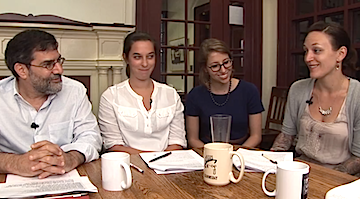Those of you who have followed this blog for a while (or who know me) know that I’m a massive fan of the annual event known as Modern and Contemporary American Poetry or ModPo run out of Coursera by the University of Pennsylvania. The event masquerades as a course, run for 10 weeks by the amazing Al Filreis and his exceptional team of Teaching Assistants and Community Teaching Assistants. You can certainly attend, get your certificate of attainment (or just follow along), and go on your merry way at the end of it (with a totally new approach to reading and appreciating poetry that extends way beyond the syllabus) - that’s enough of course.
For me and many others, once is just not enough. The course has become an annual excuse to revisit some of the most seminal poets of all time, to do close, but not too close, readings of some exceptional and challenging poetic work. Al has encouraged former students to come back and keep playing every year, through new material, through mentorship opportunities, new live ‘meet-ups’, new opportunities for interaction, and new approaches. Though the numbers get larger each year, the intimacy somehow seems to grow too. This year, there’s a new section for those who either want something a little different or who want to go further and deeper into the work. It’s called ModPo Plus and it features complementary poetry and its own discussion forum. Since I’ve done ModPo before, I’m working through all of the normal ModPo material and all the poems in ModPo Plus but focusing most of my discussions around the ModPo Plus material at the ModPo Plus forums. Most of my essays will have the same topic as they have in previous years, but I’m enjoying revisiting the work and coming to it with beginner’s mind - maybe going just a bit further as I explore my assignment topics. I thought it might be fun to post those essays up here. Please feel free to put your own thoughts or essays into the comments. I like the idea of these discussions spreading outwards and repeat ModPoers are encouraged to facilitate that. Oh, and if you want to join ModPo it actually isn’t too late. You can’t get a certificate as the first assignment date is passed, but you can jump right in at Gertrude Stein and join in now. The community is very warm and inclusive and nothing is mandatory.
Here’s the little essay I wrote on Emily Dickinson’s “I taste a liquor never brewed”. The full poem can be found here: https://www.poets.org/poetsorg/poem/i-taste-liquor-never-brewed-214
Of all Emily Dickinson’s poetry, “I taste a liquor never brewed” is one of the most exuberant, piling image upon image in an extended metaphor. This poem is somewhat less condensed than much of her other work, freed from constraints by the drunken slur of dash and the repetition of exclamation mark. The quatrains use a ballad form but only rhyme the second and last word of each stanza, and the initial rhyme (“Pearl” and “Alcohol”) is off, which adds to the slightly arrhythmic, wild feel as it flows from first taste to the full satiation of inebriation.
In the first stanza we we’re introduced to what the poet is drinking: a rarified drop, stronger than any produced in the famous Rhine wineries. This ‘drink’ is delivered from “Tankards scooped in pearl”, which is more evocative than specifically semantic, but suggests something like a large shell (mother-of-pearl lined), or perhaps a cloud formation with the sun shining behind. This intoxication comes from the exquisite beauty of the natural world (eco-poetics at its best).
There’s a sense in the second stanza, through rhythm, image, and punctuation, of a little subversiveness. The poet has become debauched and drunk, though not on brewed liquor, but on air, on dew, and on the blue sky of summer. Each dash functions as a pause or even a hiccup, coupled with extensive alliteration to create the rhythms of drunkenness that invite the reader to also partake. The multi-sensual impact of a blue sunlit sky captured with such precision in “Molten Blue”, provides both warmth and visual appeal, but it’s more than the flower, the sights and scents of a striking summer day. It’s the impact of that day on the poetic imagination that turns it from a moment of experience to something permanent. This is the creative flow or wellspring that the poet taps into (to keep the liquid metaphor going). It is Emily’s meta-poetic implication that turns this otherwise heady pastoral poem into something quite post-modern.
The extended metaphor of a drunkard at the inn is stretched further in the third stanza, as day becomes night and the poet continues the creative spree. The landlord might be the foxglove itself, closing petals so that the bee and butterfly, that have had their fill of sweet nectar, can drink no more. For the poet, the “high on life” inebriation doesn’t end because there’s always more beauty in the endless creative flow in this figurative inn where the tap is always open.
The final stanza shifts from the nature metaphor into a more frigid heavenly one, away from the immediacy of sensual pleasure. From these lofty heights, beyond the window, an angel (“Seraphs”) or teetotaler saint might look down from a frosty (“snowy Hats”) heaven and disapprove of such excesses of sensual joy. The reader too, who has been encouraged in the first three stanzas to partake, might disapprove of such poetic licentiousness. After all, this is the full sensual experience – sight, sound, smell, touch and taste are all evoked in a reeling swirl that is quite overwhelming. Of course, we might just join in in this moment of creative power and shared delight and let ourselves be seduced.

No comments:
Post a Comment